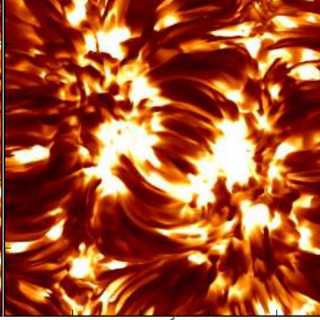Bibcode
Shchukina, N. G.; Sukhorukov, A. V.; Trujillo Bueno, J.
Referencia bibliográfica
Proceedings of the International Astronomical Union, Volume 305, pp. 368-371
Fecha de publicación:
10
2015
Número de citas
3
Número de citas referidas
3
Descripción
The solar abundances of Fe and of the CNO elements play an important
role in addressing a number of important issues such as the formation,
structure, and evolution of the Sun and the solar system, the origin of
the chemical elements, and the evolution of stars and galaxies. Despite
the large number of papers published on this issue, debates about the
solar abundances of these elements continue. The aim of the present
investigation is to quantify the impact of photospheric magnetic fields
on the determination of the solar chemical abundances. To this end, we
used two 3D snapshot models of the quiet solar photosphere with a
different magnetization taken from recent magneto-convection simulations
with small-scale dynamo action. Using such 3D models we have carried out
spectral synthesis for a large set of Fei, Ci, Ni, and Oi lines, in
order to derive abundance corrections caused by the magnetic, Zeeman
broadening of the intensity profiles and the magnetically induced
changes of the photospheric temperature structure. We find that if the
magnetism of the quiet solar photosphere is mainly produced by a
small-scale dynamo, then its impact on the determination of the
abundances of iron, carbon, nitrogen and oxygen is negligible.
Proyectos relacionados

Magnetismo, Polarización y Transferencia Radiativa en Astrofísica
Los campos magnéticos están presentes en todos los plasmas astrofísicos y controlan la mayor parte de la variabilidad que se observa en el Universo a escalas temporales intermedias. Se encuentran en estrellas, a lo largo de todo el diagrama de Hertzsprung-Russell, en galaxias, e incluso quizás en el medio intergaláctico. La polarización de la luz
Tanausú del
Pino Alemán